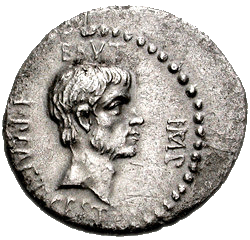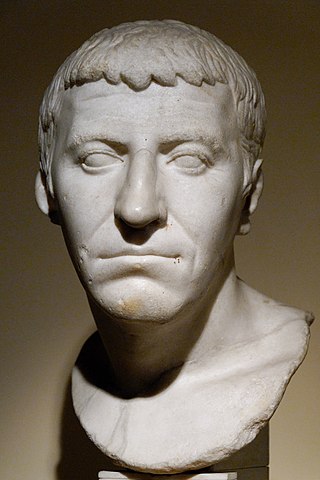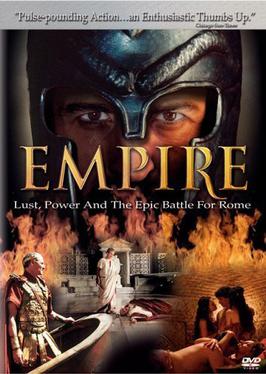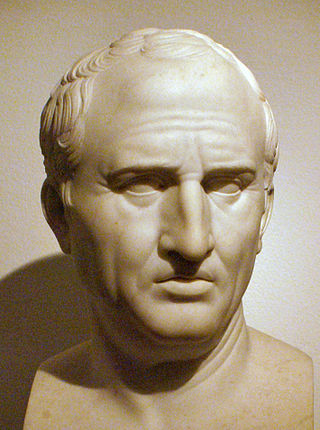
Marcus Antonius, commonly known in English as Mark Antony, was a Roman politician and general who played a critical role in the transformation of the Roman Republic from a constitutional republic into the autocratic Roman Empire.

This article concerns the period 49 BC – 40 BC.

Marcus Junius Brutus was a Roman politician, orator, and the most famous of the assassins of Julius Caesar. After being adopted by a relative, he used the name Quintus Servilius Caepio Brutus, which was retained as his legal name. He is often referred to simply as Brutus.

Year 42 BC was either a common year starting on Monday, Tuesday or Wednesday or a leap year starting on Tuesday of the Julian calendar and a common year starting on Tuesday of the Proleptic Julian calendar. At the time, it was known as the Year of the Consulship of Lepidus and Plancus. The denomination 42 BC for this year has been used since the early medieval period, when the Anno Domini calendar era became the prevalent method in Europe for naming years.

Gaius Cassius Longinus was a Roman senator and general best known as a leading instigator of the plot to assassinate Julius Caesar on 15 March 44 BC. He was the brother-in-law of Brutus, another leader of the conspiracy. He commanded troops with Brutus during the Battle of Philippi against the combined forces of Mark Antony and Octavian, Caesar's former supporters, and committed suicide after being defeated by Mark Antony.
Servilia was a Roman matron from a distinguished family, the Servilii Caepiones. She was the daughter of Quintus Servilius Caepio and Livia, thus the maternal half-sister of Cato the Younger. She married Marcus Junius Brutus, with whom she had a son, the Brutus who, along with others in the Senate, assassinated Julius Caesar. After her first husband's death in 77, she married Decimus Junius Silanus, and with him had a son and three daughters.
Decimus Junius Brutus Albinus was a Roman general and politician of the late republican period and one of the leading instigators of Julius Caesar's assassination. He had previously been an important supporter of Caesar in the Gallic Wars and in the civil war against Pompey. Decimus Brutus is often confused with his distant cousin and fellow conspirator, Marcus Junius Brutus.

Porcia, occasionally spelled Portia, especially in 18th-century English literature, was a Roman woman who lived in the 1st century BC. She was the daughter of Marcus Porcius Cato Uticensis and his first wife Atilia. She is best known for being the second wife of Marcus Junius Brutus, the most famous of Julius Caesar's assassins, and appears primarily in the letters of Cicero.
Masters of Rome is a series of historical novels by Australian author Colleen McCullough, set in ancient Rome during the last days of the old Roman Republic; it primarily chronicles the lives and careers of Gaius Marius, Lucius Cornelius Sulla, Pompey the Great, Gaius Julius Caesar, and the early career of Caesar Augustus. It spans from January 1, 110 BC through to January 16, 27 BC.

Julius Caesar is a 2003 miniseries about the life of Julius Caesar. It was directed by Uli Edel and written by Peter Pruce and Craig Warner. It is a dramatization of the life of Julius Caesar from 82 BC to his death in 44 BC. It was one of the last two films of Richard Harris, released in the year of his death. The series was originally broadcast on TNT in two parts, airing June 29 and 30, 2003. The tagline for the miniseries was His Time Has Come. The miniseries was nominated for 2 Emmys for Outstanding Makeup for a Miniseries, and Outstanding Sound Editing.

Empire is an American historical television series for ABC. It is an historical drama set in 44 BC Rome, and covers the struggle of a young Octavius, the nephew and heir of Julius Caesar, to become the first emperor of Rome. Octavius is helped in his quest by a fictitious gladiator called Tyrannus.

The Liberators' civil war was started by the Second Triumvirate to avenge Julius Caesar's assassination. The war was fought by the forces of Mark Antony and Octavian against the forces of Caesar's assassins, led by Marcus Junius Brutus and Gaius Cassius Longinus, referred to as the Liberatores. The latter were defeated by the Triumvirs at the Battle of Philippi in October 42 BC, and committed suicide. Brutus committed suicide after the second part of the battle.
The gens Octavia was a plebeian family at ancient Rome, which was raised to patrician status by Caesar during the first century BC. The first member of the gens to achieve prominence was Gnaeus Octavius Rufus, quaestor circa 230 BC. Over the following two centuries, the Octavii held many of the highest offices of the state; but the most celebrated of the family was Gaius Octavius, the grandnephew and adopted son of Caesar, who was proclaimed Augustus by the senate in 27 BC.

Julius Caesar was assassinated by a group of senators on the Ides of March of 44 BC during a meeting of the Senate at the Curia of Pompey of the Theatre of Pompey in Rome where the senators stabbed Caesar 23 times. They claimed to be acting over fears that Caesar's unprecedented concentration of power during his dictatorship was undermining the Roman Republic. At least 60 to 70 senators were party to the conspiracy, led by Marcus Junius Brutus, Gaius Cassius Longinus, and Decimus Junius Brutus Albinus. Despite the death of Caesar, the conspirators were unable to restore the institutions of the Republic. The ramifications of the assassination led to his martyrdom, the Liberators' civil war and ultimately to the Principate period of the Roman Empire.

The political career of Marcus Tullius Cicero began in 76 BC with his election to the office of quaestor, and ended in 43 BC, when he was assassinated upon the orders of Mark Antony. Cicero, a Roman statesman, lawyer, political theorist, philosopher, and Roman constitutionalist, reached the height of Roman power, the Consulship, and played a critical role in the transformation of the Roman Republic into the Roman Empire. A contemporary of Julius Caesar, Cicero is widely considered one of Rome's greatest orators and prose stylists.

The military campaigns of Julius Caesar were a series of wars that reshaped the political landscape of the Roman Republic, expanded its territories, and ultimately paved the way for the transition from republic to empire. The wars constituted both the Gallic Wars and Caesar's civil war.

Dictator is a historical novel by British author Robert Harris, published in 2015, which concludes his trilogy about the life of the Roman lawyer, politician and orator, Cicero. Dictator follows the first novel Imperium (2006) and the second novel Lustrum (2009). It is both a biography of Cicero and a tapestry of Rome in the time of Pompey, Crassus, Cato, Caesar, Clodius and ultimately Octavian.













